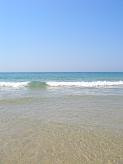Welcome to this week's Marine News Roundup. We hope you enjoy these marine-related stories - leave us a comment below and let us know what you think!
Arctic sea ice [Infographic]
Facts, numbers, data, letters on a page; they're not always so easy to understand. Over the past few years data visualisation has become increasingly popular; it's a way to help explain complex data. Here, BBC Earth demonstrate two alternative ways to show how the extent of Arctic sea ice has changed over the past 20 years.
Eating fish reduces risk of Alzheimer's disease
People who eat baked or broiled fish on a weekly basis may be improving their brain health and reducing their risk of developing mild cognitive impairment (MCI) and Alzheimer's disease, according to a study presented today at the annual meeting of the Radiological Society of North America (RSNA).
How Sharks Go Fast
Researchers have discovered what makes the shark almost impossible to outswim. By using an engineering imaging technique, researchers have discovered that as a shark’s tail swings from side to side, it creates twice as many jets of water as other fishes’ tails, smoothing out the thrust and likely making swimming more efficient. Sharks do this by stiffening the tail midswing, a strategy that might one day be applied to underwater vehicles to improve their performance.
Turtle embryos tune in to heartbeats
Turtle embryos tune into each others' heartbeats so they are able to hatch at roughly the same time, say Australian researchers.
Marine reserves get public support
More than 50,000 people are calling on the government today to create a network of marine protected areas (MPAs) for wildlife.
New facilities around the Island of Man for marine wildlife enthusiasts
Wildlife enthusiasts are to be given access to binoculars and information panels to identify their favourite marine animals and birds at a number of vantage points around the Isle of Man. The project, which involves five different sites around the coastline, has been planned for some time but has now been given a kickstart with a donation from Barclays Wealth.
Sustainable Seafood Coalition
Major seafood businesses who are frustrated with the lack of progress to overturn the practice of discarding edible fish at sea have joined the Sustainable Seafood Coalition. Sustainable Seafood Coalition members have voluntarily decided to sell seafood that is currently underutilised or discarded and to encourage consumers to eat a wider variety of sustainable seafood.
'Monogamy' and 'pair bonding' practiced among certain fish species
Recent research on the mating behaviour of fish has proved that certain species practice the "one husband one wife" rule even when in a school, researchers have recently announced.
Stop badmouthing sharks that bite people
The phrase "shark attack" is sensationalist and damaging – bites by sharks are often investigatory or defensive. To suggest that shark-on-human encounters should be called predations would be wrong. The way sharks encounter seals is fundamentally different from how they treat humans. The time is right for science to reconsider its use of the phrase "shark attack" on humans. Such language creates a one-dimensional perception of these events and makes protecting threatened shark species more difficult. After all, why care about an animal that wants to eat us?
Killer whale washes up on Point Reyes beach
Wildlife officials are trying to determine the cause of death of a killer whale that washed ashore on a Point Reyes beach. The orca was a male juvenile, about 18 feet long, that had washed up in an isolated area along Driftwood Beach, just north of McClure's Beach. Early necropsy results indicated blood in the blowhole and a blood clot in the head. No determination as to cause of death has been made yet.
Albino ginger seal rejected by family now star attraction at Russian zoo
An albino seal that was rejected by his family for 'being ginger' has become a huge hit with tourists at her new home in Russia.
We're Running Out Of Cod
Cod has played a central role in the cultural history and economic development of New England fishing communities for more than 400 years. In recent decades, however, the story of the humble cod has shifted to one of destruction. Modernised technologies and more efficient fishing methods along with increased competition and toothless regulations have guided the cod industry to the brink of collapse.
Early Humans Were Skilled Deep-Sea Fishermen
Prehistoric humans living more than 40,000 years ago had mastered the skills needed to catch fast-moving, deep ocean fish such as tuna, a remarkable new archaeological find has revealed.
Hong Kong's shark fin traders feel pressure to change
The owner of Shark's Fin City, a dried fin wholesaler in Hong Kong's quarter for all things shrivelled, says there are only a few people who know the truth about sharks, and he's one of them. Like many Hong Kong businessmen who trade in shark fins, Kwong Hung-kwan believes his industry is being targeted by an anti-Chinese conspiracy led by "Western" environmental groups like Greenpeace. Talk of a dramatic decline in shark populations around the world is rubbish, he says, dismissing research showing an eight-fold jump in threatened shark species since 2000.
Seal pup rescued after sheltering in oil boat
A two-week-old grey seal pup returned to the oil supply boat after he was put back in the sea. The pup is being treated at the Highland Seal Hospital near John O'Groats after surviving a marathon 100-mile journey. Named Viking, he was rescued after crew on the Subsea Viking found him sheltering on the boat, 120 miles north-west of Shetland, last week. The seal, which still had his fluffy yellow coat grey seals are born with, had clambered aboard and made himself at home on the platform used to launch remote-controlled vehicles.
Thursday, 1 December 2011
Marine News Roundup
Labels:
Arctic,
BBC Earth,
Cod,
Deep Sea,
Finning,
Fish,
Fishermen,
Killer Whale,
Marine Reserves,
Pair Bonding,
Seafood,
Seals,
Shark Attacks,
Shark Fins,
Sharks,
Sustainable,
Turtles
Subscribe to:
Post Comments (Atom)

No comments:
Post a Comment